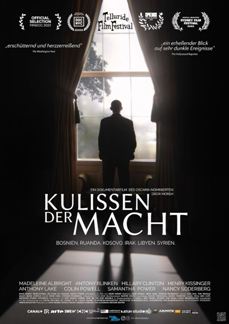![]()
USA | Israel |Germany | France | UK | Belgium | Norway | Netherlands | Denmark 2022
Opening May 30, 2024
Directed by: Dror Moreh
Writing credits: Documentary
Principal actors: (Voice) Jeff Burrell, Harvey Friedman, Dulcie Smart
 Israeli writer-director Dror Moreh’s exceptionally pragmatic, intelligent documentary takes a look at Western countries’ choices, particularly the one perceived most powerful. Particularly, how they cope in the face of the spillover from foreign conflicts—war crimes, genocide, and the accompanying atrocities. At the end of the Second World War the liberated and liberators’ catchphrase, “never again,” became a force that guided nations for decades. Moreh laser focuses on the only global superpower, since the dissolution/collapse of the Soviet Union, the United States of America’s commitment to “never again.” Talking on camera are individuals, mostly officials from the U.S. government and military, with a wealth of expertise who add insight, commentary, and strategic reasoning, plus those that express their personal moral quandaries that accompanied such decisions.
Israeli writer-director Dror Moreh’s exceptionally pragmatic, intelligent documentary takes a look at Western countries’ choices, particularly the one perceived most powerful. Particularly, how they cope in the face of the spillover from foreign conflicts—war crimes, genocide, and the accompanying atrocities. At the end of the Second World War the liberated and liberators’ catchphrase, “never again,” became a force that guided nations for decades. Moreh laser focuses on the only global superpower, since the dissolution/collapse of the Soviet Union, the United States of America’s commitment to “never again.” Talking on camera are individuals, mostly officials from the U.S. government and military, with a wealth of expertise who add insight, commentary, and strategic reasoning, plus those that express their personal moral quandaries that accompanied such decisions.
The depth and breadth of information is staggering, stretching across U.S. presidencies from Ronald Reagan to Barack Obama. These administrations’ leadership in response to the bad-faith behavior by perpetrators to the vanquished during armed conflicts is under the microscope, e.g., the Balkans, Rwanda, Syria, et al. Paul Wolfowitz, Samuel “Sandy” Berger, Madeline Albrecht, John H. F. Shattuck, Nancy Soderberg, Henry Kissinger, Hilary Clinton, Samantha Power, and many more add hindsight to resolutions made and moves taken under, oftentimes, intense pressure. The film is laid out in sections appropriately titled Chaos, Priorities, Missing, Interests, etc. Shown is frontline photojournalists raw, graphic material that includes real-time footage from the Srebrenica massacre—paralleled in the 2021 narrative film Quo Vadis, Aida? It is chilling—some may want to close their eyes.
Oron Adar and Stephan Krumbiegel’s compendious editing is astute, easily accommodating the archival footage, e.g., including the Auschwitz-Birkenau concentration camp. Kobi Zaig-Mendez’s cinematography is balanced, steady and Freya Arde’s flowing, fluctuating score advocates relief, respite, release. Audiences should have more understanding, and questions, for the complexities of modern-day geo-political wars after seeing Kulissen der Macht. The global war correspondents and photojournalists merit the utmost respect for their reportage. 135 minutes (Marinell H.)
